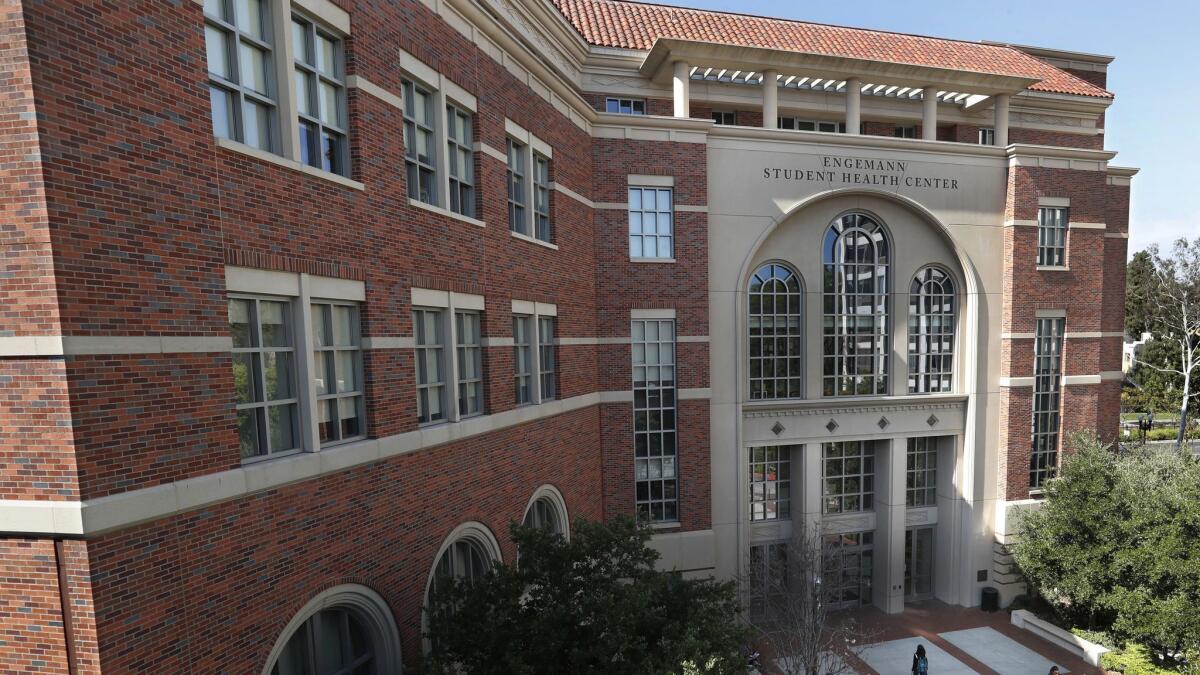USC’s handling of complaints about campus gynecologist is being investigated by federal government

- Share via
The U.S. Department of Education announced Monday that it has launched an investigation into how the University of Southern California handled misconduct complaints against a campus gynecologist, the latest fallout in a scandal that has prompted the resignation of USC’s president, two law enforcement investigations and dozens of lawsuits.
In revealing the inquiry by the department’s Office of Civil Rights, officials rebuked USC for what they alleged was improper withholding of information about Dr. George Tyndall during a previous federal investigation.
Secretary of Education Betsy DeVos, who has been criticized for taking a less vigorous approach to examining sexual misconduct than predecessors, called for a “systemic” examination of USC and urged administrators to fully cooperate.
“No student should ever endure sexual harassment or abuse while trying to pursue their education,” DeVos said in a statement.
The Education Department’s action is the second high-profile investigation of a university’s handling of sexual misconduct complaints this year. The agency launched an investigation in January into Michigan State’s response to Dr. Larry Nassar, the USA Gymnastics doctor convicted of sexual misconduct toward young patients.
The agency said that under a previous agreement with USC concerning other allegations of sexual misconduct, administrators were legally required to turn over all reports and complaints about university staff from 2010 to 2013. The Times revealed last month that during this period, Tyndall was under investigation by USC after staff complained about inappropriate comments during pelvic exams.
“At no time during the investigation or negotiations did USC provide OCR with any information regarding reports or complaints allegedly received against Dr. Tyndall,” the Education Department said in a statement.
DeVos said Monday that “attempts to obfuscate or hide Title IX violations from the Department will not be tolerated, and I am calling on USC to cooperate fully and completely with this investigation.”
USC did not respond directly to the accusation of withholding information. In a statement, Rick Caruso, the recently elected chair of USC’s Board of Trustees, said, “We welcome the U.S. Department of Education’s investigation and the university will fully cooperate with their inquiry.”
The Times reported in May that during 27 years at USC’s student health clinic, Tyndall had been accused repeatedly of “creepy” behavior, including improperly photographing patients’ genitals, touching women inappropriately during pelvic exams and making sexually suggestive and sometimes crude remarks about their bodies.
There were numerous investigations of Tyndall, including a 2013 review by USC’s Office of Equity and Diversity, which is charged with investigating sexual harassment and other misconduct cases. A nurse who was frustrated by administrators’ inaction reported Tyndall to a campus rape crisis center in 2016, and the physician was placed on leave.
A university investigation determined that Tyndall sexually harassed patients, and he was allowed to resign quietly with a payout.
Tyndall has denied wrongdoing; he could not immediately be reached for comment Monday.
In the wake of The Times’ report, more than 400 women contacted a university hotline to report concerns about the physician. The Los Angeles Police Department is reviewing at least 52 complaints of misconduct involving Tyndall, and more than two dozen former patients have sued the doctor and the university in recent weeks. The Medical Board of California is also investigating Tyndall.
How USC handled Tyndall’s case also generated an uproar on campus, and hundreds of faculty called on President C.L. Max Nikias to resign. Late last month, Caruso announced that Nikias had agreed to resign and said the law firm O’Melveny & Myers would conduct an investigation into Tyndall and “reporting failures” at the campus clinic.
As part of the Education Department’s Michigan State probe, investigators have questioned some of Nassar’s victims, according to attorney John Manly, an Irvine-based lawyer who helped secure a $500-million settlement for many of the young women.
“The career investigators take this very seriously,” said Manly, who is now representing dozens of Tyndall’s former patients. “They want to know what [university administrators] knew, when they knew it and what they did if anything to conceal it.”
How sexual misconduct is addressed is one of the most fraught issues on college campuses, and since taking office last year, DeVos has broken sharply with the previous administration’s policies for campus sexual discrimination and violence.
DeVos has criticized the Obama administration’s approach. Her administration has allowed universities to use a more stringent standard of evidence for assessing allegations. The Obama-era proceedings, she said, often did not protect the rights of the accused and could be accurately described as “kangaroo courts.”
“[I]f everything is harassment, then nothing is,” she said in a speech last year.
Catherine Lhamon, who served as the Education Department’s assistant secretary for civil rights in the Obama administration, said holding universities accountable was important, but expressed frustration that DeVos was taking a hard line only on misconduct that had already been exposed and was under intense scrutiny by the media and law enforcement.
“This is a publicity stunt,” she said of the USC probe. “It offers very little comfort to the students at those schools, much less the 7,000 schools who are denied systemic investigations.”
[email protected] | Twitter: @MattHjourno
[email protected] | Twitter: @latimesharriet
UPDATES:
3:45 p.m.: This article was updated with a statement from Rick Caruso, the chair of USC’s Board of Trustees.
This story was originally published at 1:55 p.m.
More to Read
Sign up for Essential California
The most important California stories and recommendations in your inbox every morning.
You may occasionally receive promotional content from the Los Angeles Times.












